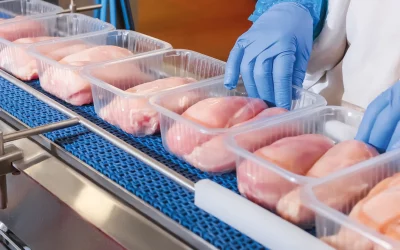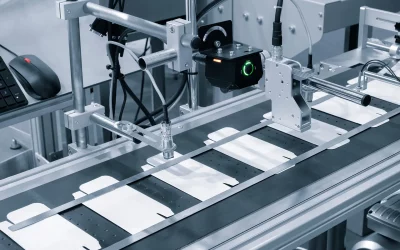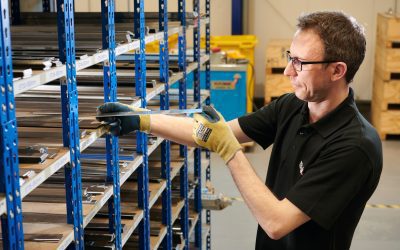The Vital Role of Machine Knives in Industrial Baking:
Machine knives in industrial settings are far more than just tools; they are the heartbeats of automated systems that drive mass production. A seamless integration of these knives ensures not only uninterrupted operations but also the high-calibre precision required for uniform product quality that customers have come to expect.
Precision-engineered machine knives are key to achieving high-volume outputs without sacrificing the artisanal quality that consumers desire. These tools are the hidden drivers of efficiency that allow bakeries to thrive in competitive markets.
Minimising Downtime in High-Output Operations:
In this fast turnover environment of industrial baking, downtime is the adversary of progress. Premium-grade knives offer robust solutions that withstand the rigors of continuous operation, diminishing the need for frequent replacements and allowing for a smoother production flow.
Diverse Types of Machine Knives For Bakery Operations
Whether you know it or not, not all machine knives are created equal. Depending on the specific tasks and the types of machinery used, you may require numerous kinds of knives for your bakery operations. Some of the commonly used types include bandsaw blades, bread slicers, formed cutters, and portioning blades.
Bandsaw Blades
These blades are primarily used for cutting large blocks of dough or loaves of bread into smaller, manageable pieces. They are designed to withstand high-pressure cutting operations while maintaining their sharpness.
Bread Slicers
Bread slicers are designed for precision slicing of baked loaves into uniform slices. They are typically used in large bakeries, supermarkets, and sandwich shops, where high-volume bread slicing is required.
Formed Cutters
Formed cutters are used to shape the dough into various forms before the baking process. They come in different shapes and sizes, allowing for a wide range of bread and pastry designs.
Portioning Blades
Portioning blades are essential for dividing dough into equal portions. This ensures uniformity in size and weight, which is crucial for maintaining consistent product quality and meeting specific customer requirements.
Selecting the Right Machine Knives For Your Bakery Operations
Choosing the right machine knives for your bakery operations can significantly impact your production process’s efficiency and quality. Here are some factors to consider:
Quality of Material
The material of the blade plays a crucial role in its durability and performance. High-grade, food-safe stainless steel is a popular choice due to its exceptional hardness and corrosion resistance.
Blade Coating
Choosing a blade with a high-quality coating can enhance its performance and lifespan. Non-stick coatings, for example, can prevent food from sticking to the blade, resulting in cleaner cuts and easier cleaning.
Blade Bevels
The bevel of a blade refers to the part that has been sharpened to a point. Depending on the type of bread you are processing, you may require blades with different types of bevels. For instance, a double bevel edge is suitable for softer bread types, while a single bevel edge is ideal for harder bread types.
Machine Blade Properties Per Bread Type
Different types of bread require different types of machine blades due to their varying textures and densities. Here’s a quick guide to help you choose the right machine knives for different bread types:
White Bread
White bread is soft and delicate, requiring a machine knife with a scalloped profile and a double bevel edge. A blade with these features can easily penetrate the loaf’s crust without tearing the inside.
Wheat-based Bread Products
For wheat-based bread products with harder crusts, a machine knife with a scalloped profile and a single bevel edge is recommended. This type of blade provides improved cutting force, essential for slicing through tougher textures.
Hard Crust, Dense Bread Products
For bread products like rye bread, which have a particularly hard and dense texture, using the highest-quality bread slicers is advised. These products might also benefit from blades coated with titanium nitride or titanium carbon nitride, adding extra wear resistance.
Potato Loaves
Potato loaves have a higher internal moisture content than other types of loaves due to the use of potato flour. Machine knives used for potato loaves should have a double-bevelled edge and a non-stick coating to prevent excessive friction and heat build-up.
Low-fat or Zero-fat Bread Products
Low-fat or zero-fat bread products have a very low moisture content, resulting in significant amounts of friction and heat build-up during operation. For these types of bread products, machine knives with a single bevel edge and a parallel grind on the blade edge are recommended. Additionally, using a lubricant or spray can help prevent excessive friction and heat build-up.
Selecting the right machine knives based on the specific types of bread products you’re processing can significantly extend your blades’ lifespan, ensuring optimal performance and cost-effectiveness.
Partnering with MRMK for Your Industrial Needs:
MRMK doesn’t just supply knives; we deliver cutting-edge solutions designed for the pinnacle of industrial bakery operations. Our commitment to excellence ensures that our clients are equipped with nothing but the best.
Experience the MRMK difference, where exceptional quality and customer satisfaction are our top priorities, ensuring your operations are always a cut above the rest. Our team will discover more about your production line and guide you on the best solutions for your machinery and products.
Get in touch with us today and experience the MRMK difference.



